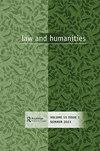‘A black day, this’: Irish poetry and the fall of Srebrenica
IF 0.2
Q3 LAW
引用次数: 0
Abstract
ABSTRACT The Bosnian War elicited a substantial number of poetic responses from Irish poets, writing in both English and in Irish. This article focuses on one frequently anthologized poem in particular, namely the poem ‘Dubh’ [‘Black’] by Nuala Ní Dhomhnaill, written on the fall of Srebrenica, 11 July 1995. A close reading of this poem is set in the context of both the United Nations response to the war in Bosnia and the Irish government’s response. Relevant legal instruments and sources of international law are referenced to illuminate those aspects of the poem that evidence a penetrating analysis of events in Srebrenica. This article contends that poetry that responds to human rights violations should not be understood in terms of empathy and affect alone; such poetry can fulfil an analytical function that serves to hold the human rights regime itself to account.“黑色的一天,这”:爱尔兰诗歌与斯雷布雷尼察的沦陷
摘要波斯尼亚战争引发了爱尔兰诗人大量的诗歌回应,他们用英语和爱尔兰语写作。这篇文章特别关注一首经常被选集的诗,即努拉·尼多姆奈尔于1995年7月11日在斯雷布雷尼察沦陷时创作的诗《Dubh》[《Black》]。细读这首诗的背景是联合国对波斯尼亚战争的反应和爱尔兰政府的反应。引用了相关的法律文书和国际法来源,以阐明这首诗的那些方面,这些方面证明了对斯雷布雷尼察事件的深入分析。本文认为,对侵犯人权行为作出回应的诗歌不应仅从同情和情感的角度来理解;这样的诗歌可以起到分析的作用,有助于追究人权制度本身的责任。
本文章由计算机程序翻译,如有差异,请以英文原文为准。
求助全文
约1分钟内获得全文
求助全文
来源期刊

Law and Humanities
LAW-
CiteScore
1.00
自引率
0.00%
发文量
21
期刊介绍:
Law and Humanities is a peer-reviewed journal, providing a forum for scholarly discourse within the arts and humanities around the subject of law. For this purpose, the arts and humanities disciplines are taken to include literature, history (including history of art), philosophy, theology, classics and the whole spectrum of performance and representational arts. The remit of the journal does not extend to consideration of the laws that regulate practical aspects of the arts and humanities (such as the law of intellectual property). Law and Humanities is principally concerned to engage with those aspects of human experience which are not empirically quantifiable or scientifically predictable. Each issue will carry four or five major articles of between 8,000 and 12,000 words each. The journal will also carry shorter papers (up to 4,000 words) sharing good practice in law and humanities education; reports of conferences; reviews of books, exhibitions, plays, concerts and other artistic publications.
 求助内容:
求助内容: 应助结果提醒方式:
应助结果提醒方式:


